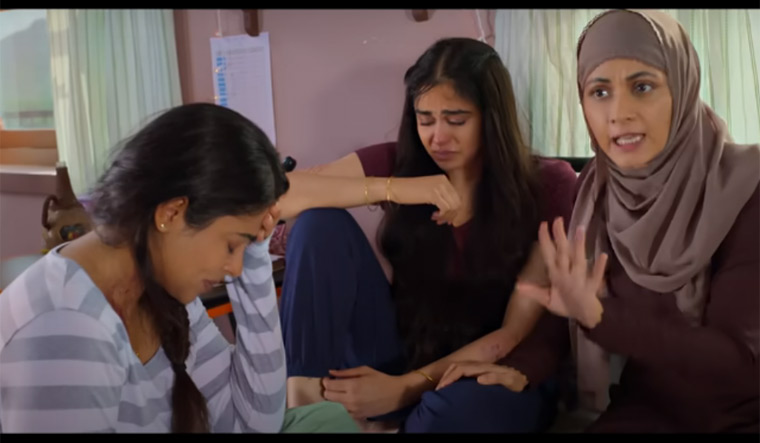One of the maxims of movie criticism is to never pay much attention to the publicity material. Or to the backstory of those making the film. Abiding by this maxim is certainly the nicest thing you could do for The Kerala Story and its director Sudipto Sen. After all, floating on the internet are trailers of his past efforts such as The Last Monk and Guruji: Ahead of Time, some of them put up by Sen himself, in what is clearly a case of self-sabotaging the plans of making wider audiences watch his films.
There was a point in The Kerala Story’s publicity drive that gave the impression that Sen had finally got the art of promoting his movies right. The movie was gaining buzz—there is no such thing as bad buzz, really—and it seemed that it might just become The Kashmir Files of Kerala politics. But then, around the time of the previews, Sen began to give ridiculous sound bites, insisting that he had made a coherent film based on meticulous research and at least one botched RTI query. Cleverer filmmakers would have said they had employed the broad brush of artistry to try and paint an intricate reality, but Sen would have none of it. He seemed to want the world to know that he had bitten off more than he could chew. Which is why ignoring the film’s pre-release clamour is an act of kindness.
But then, you also find limits to your mercy when your Friday trip to the movie theatre involves wading through angry protesters to reach the hall, claim the seat next to an elderly gentleman, and spend the next few minutes explaining to him where the Adipurush teaser ended and the IB71 trailer began. “A lot of these type of movies are getting made; it’s difficult to keep track of which is which,” he says. I nod in agreement. The director Steven McQueen once said that watching films was a communal experience. Boy, wasn’t he profound!
The film starts, and you know Sen is in his element when you see the words ‘The Kerala Story’ plastered across a visual of what seems to be the Hindu Kush in Afghanistan. A burkha-clad woman is being smuggled across the unforgiving desert, and we learn that she hails from a verdant Kerala village. Cue canoes, rivers, paddy fields, temples and, of course, kathakali. Nobody can accuse Sen of not doing homework.
We learn that the woman in the desert is Shalini Unnikrishnan, whom Adah Sharma plays as the epitome of the beautiful—but most importantly gullible—Hindu Malayali village girl. Shalini’s story unfolds in a fashionably non-linear manner. The older Shalini has become the inmate of a UN-run detention centre near the Iran-Afghan border.
She recounts to anti-terror officials how she converted to Islam, became Fatima Ba, and joined the Islamic State in Syria. The story of the younger Shalini, meanwhile, unfolds in a nursing college in Kasargod district, “where sharia is the law of the land”, and where she befriends two Christian girls and a scheming Muslim woman. Incidences of Fatima’s travails in Syria and Afghanistan are juxtaposed with the road to hell she takes in Kerala. She and a Christian girl double-date two Muslim boys—dreamboats who turn out to be dastardly deceivers.
The story, co-written by Sen, is apparently based on the story of a group of young men and women that moved to Syria to join the Islamic State between 2016 and 2018. Much of the details regarding what happened to them are in public domain, and Sen and his co-writers seem to have made good use of them.
But their intention is not to throw further light on how they were radicalised and what motivated them to undertake the journey. It is obvious that the writers have no interest in character exposition at all; instead, they mould the contours of the case into a chalice filled with anti-Muslim venom that would fill viewers with fear and loathing.
Throughout the film, there is not a single Muslim character that comes across as humane, and not one non-Muslim character who is not a victim of the Islamist conspiracy.
As propaganda, though, The Kerala Story is quite inept. Sen is no Riefenstahl or Griffith who could push the filmmaking envelope even while peddling unsavoury stuff. At best, he is perhaps India’s answer to Uwe Boll—a director who wears his incompetence and total lack of subtlety as a badge of pride.
The sweep of the story is also not matched by the film’s production values. We see a high-security terrorist incarceration camp built with corrugated roofing sheets. Whatever money thus saved has obviously been poured into Shalini’s hostel room, with its double-panelled curtains and faux decorations. Oversized mugshots of Marx, Lenin and Stalin dominate the home of the Communist father of a Christian girl who falls prey to the Islamist plot. The girl herself later blames the father for her fall—he had not been mindful about teaching her about her own religion and culture. The father weeps, and so must the viewers.
The gaze of the film is distinctly North Indian. Sen’s Kerala is a place where Diwali is a big festival and the beach is a fixture in everyday life. And just as one of the characters in the movie starts a diatribe against Communists, Sen brings a B.T. Ranadive memorial to the background, as if to drive home the point about the Calcutta Thesis.
Unfortunately, despite his sledgehammer sensibilities, Sen has not bothered to hire Malayali artists to dub for Sharma and others. At least a couple of proverbs and dozens of lovely expressions die gruesome deaths as Sen’s cardboard characters speak in Malayalam.
In his own way, Sen has made an unsparing film.



